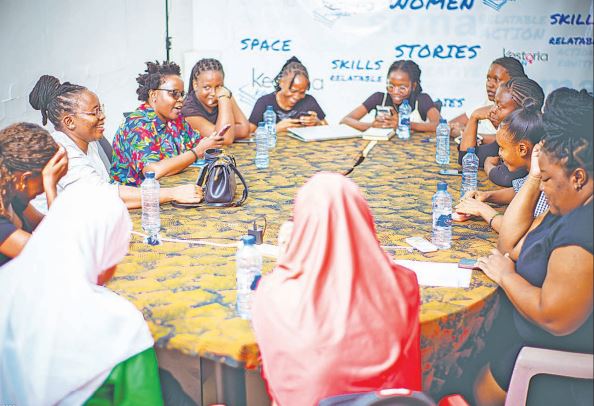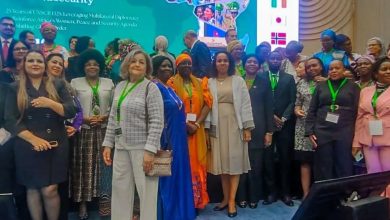How women’s voices drive change through storytelling

TANZANIA: FOR change to truly take root in communities, especially in marginalised and rural areas, the voices of women must be heard and amplified.
Across Africa, particularly in Tanzania, women face numerous social, cultural and structural barriers that silence their voices and exclude them from decision making platforms.
Yet, it is in these very voices that solutions, resilience and transformation reside.
In recognition of this reality, various initiatives are working to bridge the gap between unheard women and the larger national conversation.
One such initiative is the Feminist Storytelling Research & Writing Residency, a project housed under Kistoria Kavazi, a platform by Soma Book Café, which is committed to amplifying feminist narratives through multimedia documentation.
“To make the voices of women in remote and rural areas heard, deliberate action must be taken to bring them closer,” said Ms Dorothy Mchatta, Programmes Assistant at Soma Book Café.
She added, “that is why through the Feminist Storytelling project, we support storytelling as a medium to amplify women’s experiences.”
Kistoria Kavazi is not just a collection of tales; it is a living, evolving archive that honours the “herstories” of African women.
Since 2018, the platform has been gathering oral histories, digital narratives and written stories that reflect both the struggles and triumphs of feminist leaders across different regions.
The aim is clear, to preserve the wisdom, courage and contributions of women, ensuring these stories live on from one generation to the next.
These narratives provide critical insights into the lives of women who have endured cultural discrimination, economic injustice and political exclusion, yet have continued to speak out, resist and lead change within their communities.
One of the significant issues hindering women from contributing fully to society is the lack of access to leadership positions.
This exclusion is often rooted in deep-seated cultural norms and traditions that dismiss women as incapable of leadership or decision making.
“In many parts of the country, women are still seen as unfit for leadership due to outdated beliefs,” said one of the storytellers, Ms Wemael Mmaraba featured in the Kistoria Kavazi collection.
She said, “our communities need to understand that women are not only capable but essential to sustainable development.”
Through storytelling, these barriers are being confronted head-on. Women from various places share how they have been denied opportunities, silenced in meetings and overlooked for leadership simply because of their gender.
But equally, they share stories of persistence, resistance and eventual breakthroughs, narratives that inspire others to rise and push forward.
Feminist storytelling is not merely about telling women’s stories; it is a political act of reclaiming power. It allows women to define their narratives, rather than being spoken for by others.
This form of storytelling acknowledges the intersectionality of oppression, understanding that women’s experiences are shaped by more than gender alone, including class, geography, age and disability.
Curation and Content Management Officer at Kistoria Kavazi, Ms Hedwiga Mtenga said, “through the stories we collect and preserve, we aim to contribute to the liberation of women everywhere.”
Ms Mtenga said, “when one woman tells her story, she permits others to do the same. And in that process, collective healing and collective action begin.”
The project, funded by the Open Society Fund, has supported dozens of women in documenting their experiences, turning personal pain into public knowledge and private resilience into communal resistance.
From stories of surviving gender-based violence, child marriage and harmful traditional practices, to tales of founding grassroots movements and leading community dialogues, the stories housed under Kistoria Kavazi are proof that women are not waiting to be saved, they are leading their liberation.
What makes storytelling so powerful is its accessibility. Not everyone can write a policy or lead a protest, but everyone can tell a story. And when those stories are recorded, shared and archived, they become tools of advocacy, education and resistance.
Feminist storytelling also challenges the mainstream narratives, often dominated by patriarchal perspectives. It demands space for women’s realities, honours their pain and celebrates their victories.
Moreover, it offers an intergenerational bridge, young women reading or listening to the stories of their elders learn from lived experiences and are equipped to carry the struggle forward.
It affirms the idea that women’s voices are not marginal, they are central to the story of progress.
Preserving and promoting women’s voices through storytelling helps build inclusive histories. It ensures that the contributions of women, especially those who are often left out of the spotlight, are not erased.
In doing so, the shift from a single narrative of struggle to a plurality of power, resistance and hope.
Importantly, when women share their stories, they also call upon society to take action, whether it’s confronting discriminatory practices, pushing for policy changes or simply choosing to listen and understand.
As feminist scholars often say, “The personal is political.” Every story of exclusion, survival or leadership reflects broader social and political dynamics and can spark transformation when taken seriously.
There is no development, no justice and no equality without the active inclusion of women’s voices. Projects like Kistoria Kavazi are not just preserving stories; they are igniting movements.
Through feminist storytelling, women are not only documenting their lives, they are demanding recognition, rewriting history and changing the future.
We must support platforms that allow women, especially those in remote areas, to speak, be heard and lead. Because when a woman tells her story, the world changes.





